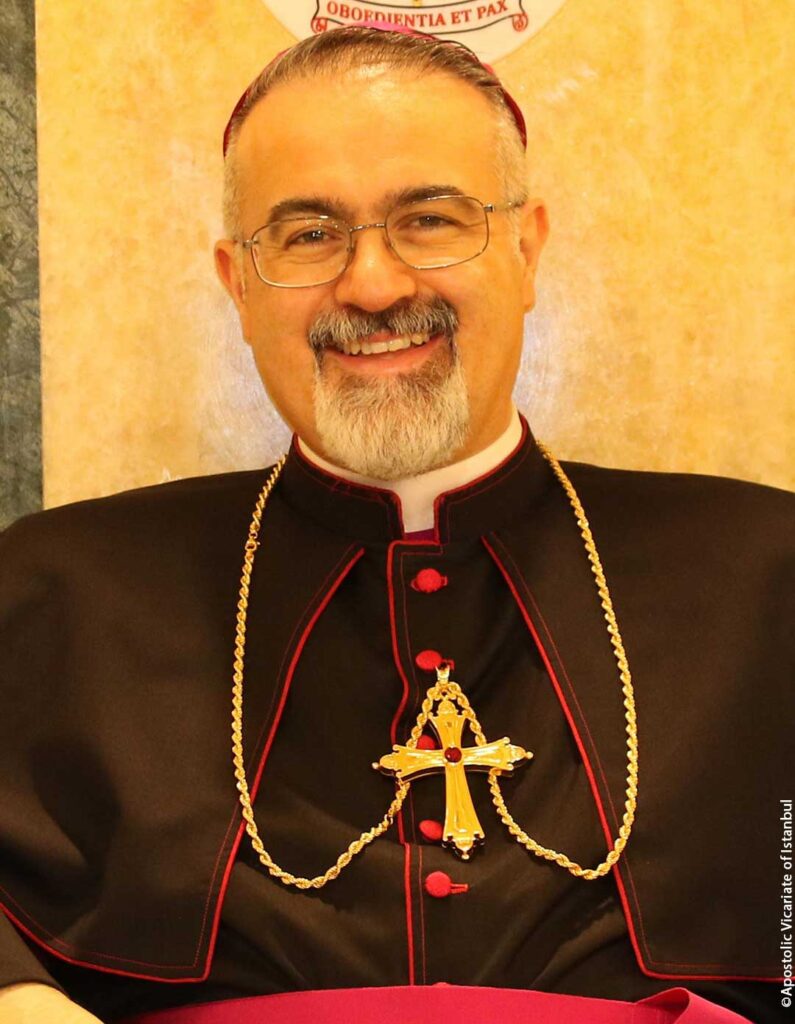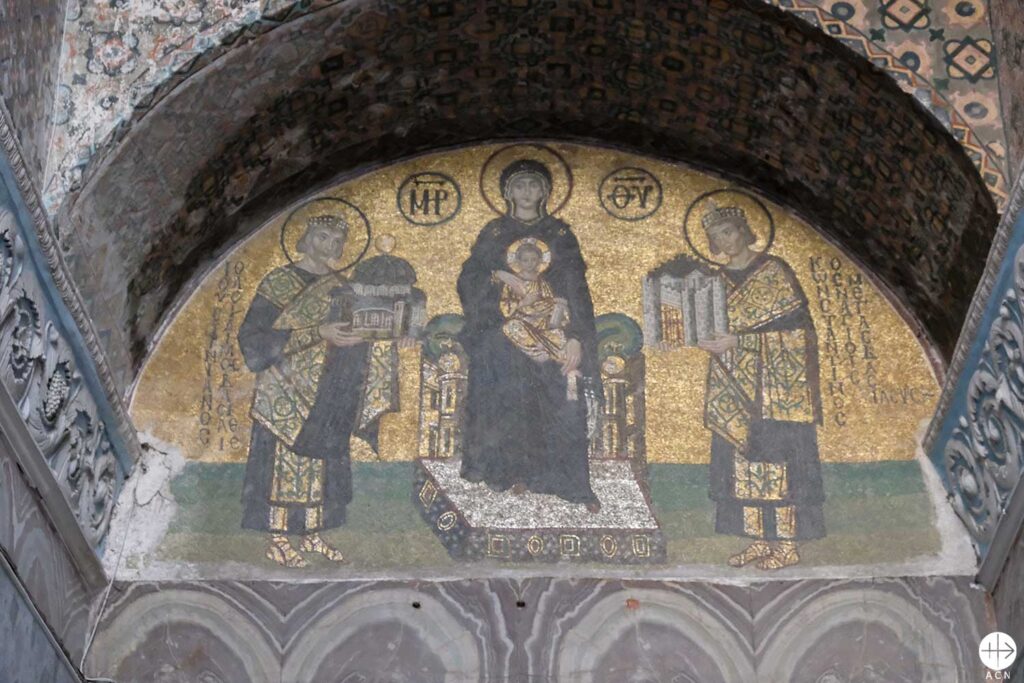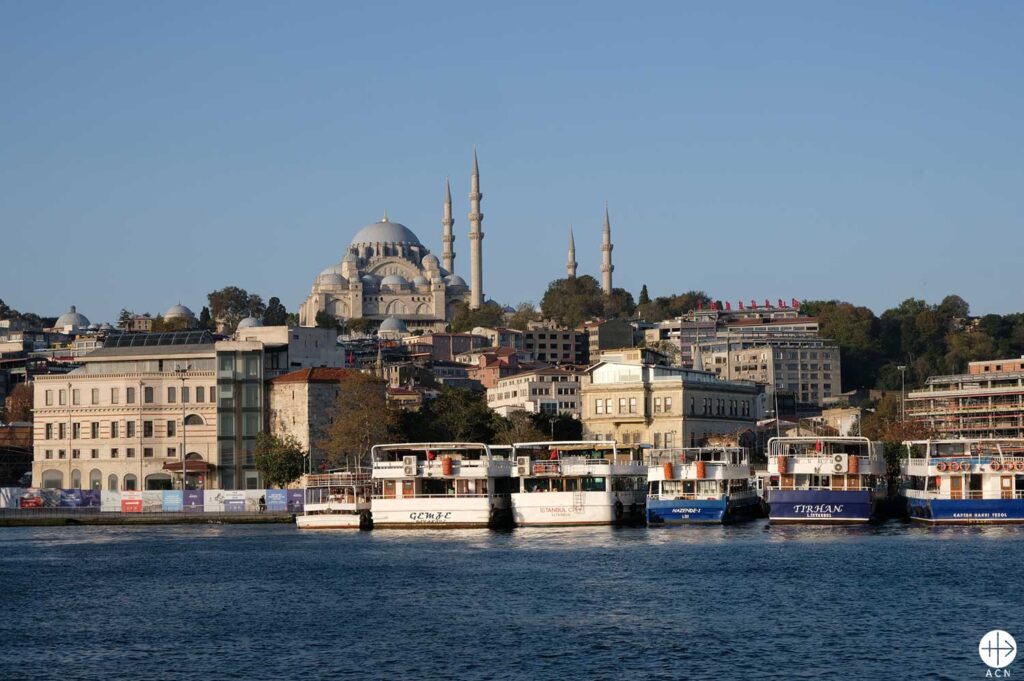Apostolic Vicar of Istanbul: “Our community awaits the arrival of Pope Leo XIV with profound joy and anticipation”
This year, the Church commemorated the 1700th anniversary of the Council of Nicaea, an important anniversary for the entire Christian world. This November, Pope Leo XIV is scheduled to visit Turkey, where the council was held, fulfilling the commitment made by Pope Francis before his death. International Catholic charity Aid to the Church in Need (ACN) spoke with Bishop Massimiliano Palinuro, the Apostolic Vicar of Istanbul, about the importance of the anniversary of Nicaea and the papal visit, ecumenical relations, and what this all means for the country’s small Catholic population.

A Papal visit to Turkey had already been a dream of Pope Francis. How has the local community reacted to this news?
Pope Francis’s journey was on the verge of being realised. In fact, even during his illness, it had been confirmed, as it was the Pope’s firm intention to come to Turkey after his recovery.
Turkey had truly committed itself to welcoming Pope Francis in an extraordinary and generous manner. After the passing of Pope Francis, the Turkish government, the local Catholic Church, and the Ecumenical Patriarch Bartholomew all renewed their invitation for Pope Leo to visit Turkey and, in particular, Nicaea, on the occasion of the 1700th anniversary of the council.
Now, it has been scheduled as Pope Leo’s first international visit. We await him with a filial heart and with immense joy. We are confident that Pope Leo’s visit will culminate in an ecumenical celebration in Nicaea itself, to bear witness in that symbolic place to the unity of faith among all believers in Christ. Too often throughout the centuries and even up to the present day, theological and confessional divisions have been used as a pretext to justify wars and persecutions. Now the world needs to see in Christians a sign of unity for the human family.
Our community awaits the arrival of Pope Leo XIV with open arms and hearts, and with profound joy and anticipation, ready to welcome him as a sign of hope and unity. We await him here, that he may strengthen and confirm our Christian community in the faith.
How important is this anniversary of the Council of Nicaea, particularly for Christians living in Turkey?
The Council of Nicaea is the council par excellence, a sort of paradigm through which the Church can understand how to resolve doctrinal problems and various types of divisions within itself. In our context, the anniversary takes on extraordinary importance, especially because it is a shared heritage of all Christian denominations. No Christian denies the Councils of Nicaea and Constantinople, because it was in them that the Christian Faith received its clearest formulation.

This anniversary is perceived by our Christians as a sign of hope for a return to the sources of faith and search for what is essential—what unites rather than what divides. In practice, the anniversary of the Council of Nicaea is “forcing” us to rediscover the treasure of faith that we all share. Faith in Jesus, the Son of God and Saviour, is what makes us Christians. At a recent conference organised here in Istanbul by the Bible Society of Turkey, Catholics, Orthodox, and Protestants of various denominations found ourselves describing the same faith in the same words, discovering that we all feel like heirs of the same Traditio fidei (Tradition of Faith).
The Catholic community in Turkey, particularly in Istanbul, inspired by the rich history of these lands, possesses immense potential to help build bridges of fraternity in a country that has long stood as a crossroads between East and West. Here, especially in daily life and everyday interactions, we are called to dismantle the walls built by centuries-old prejudices and ideological hostilities. This is a true preparatio evangelica—a preparation for the Gospel—that unfolds through both the beauty and the challenges of human relationships.
Pope Leo has already met the Ecumenical Patriarch several times. How would you describe the relationship between the two Churches in your apostolic vicariate?
The relations between the Apostolic Vicariate—and more generally the Catholic community—and Patriarch Bartholomew and the Ecumenical Patriarchate of Constantinople are excellent. In fact, I can say that here in Istanbul, ecumenical relations are definitely much stronger than anywhere else in the world. The same can be said with regard to the other Christian denominations. Perhaps it is providential that the ecumenical journey is so strong in these places: precisely here, where the great division began, the great reconciliation between the Orthodox East and the Catholic West must also begin. We are therefore constantly committed to living this fraternity, this communion, in our daily lives.

Here in Istanbul, this journey of reconciliation began with the presence of my predecessor Angelo Giuseppe Roncalli, the future Pope John XXIII, during the ten years in which he led the Apostolic Vicariate (as the Apostolic Delegation to Turkey). And on the Orthodox side, shortly thereafter, the radiant presence of Patriarch Athenagoras opened the doors of that Church as well to the ecumenical journey: he was truly, in the Orthodox world, the great prophet of unity. After him, this path was intensified by his successor Demetrios and then by Bartholomew, who for nearly 35 years has led the Orthodox Church as its primate along the road of ecumenical dialogue. Patriarchs Athenagoras, Demetrios and Bartholomew have courageously opened the path of fraternity and reconciliation here in Istanbul. All of this is bearing good fruit in genuinely fraternal relationships. This is truly a work of Grace!
Can you tell us about the preparations being made for the papal visit?
The Turkish government is completing infrastructure projects to make the archaeological remains of Constantine’s Palace—partially submerged in Lake Nicaea—accessible. The main purpose of these efforts is to ensure a worthy welcome for the Pope’s visit and to host the ecumenical celebration intended to take place precisely where the council was held, according to tradition, in the Senate Palace of Nicaea, the summer residence of Emperor Constantine.

What are your hopes and the hopes of the Christians in Turkey for the trip?
We fervently hope that this important anniversary will once again bear fruit of unity among Christians—a unity anchored in the Charity of our Christ.
Often, we are led to emphasise differences, to affirm our own identity, but this creates an obstacle to building fraternal relationships. Instead, it is fruitful to seek what unites us. This applies to interreligious dialogue, to ecumenical dialogue, but also within our ecclesial communities, where many differences are called to communion. Today we live in a polarised world, and this polarisation really risks destroying human fraternity as well as the unity of the Church. It is important to highlight the richness of diversity, bearing in mind that unity does not mean homogenisation or uniformity. Therefore, even within the same Catholic Christian community, this journey is necessary.

I would like to once again emphasise what Pope Leo XIV said before his first Urbi et Orbi blessing, which highlights where we want to go and the Church we want to be: “Together, we must look for ways to be a missionary Church, a Church that builds bridges and encourages dialogue, a Church ever open to welcoming, like this square with its open arms, all those who are in need of our charity, our presence, our readiness to dialogue and our love… we want to be a synodal Church, a Church that moves forward, a Church that always seeks peace, that always seeks charity, that always seeks to be close above all to those who are suffering.” May Our Lady Mother of God grant us all the strength and the wisdom to take this path.
Aid to the Church in Need has supported the Apostolic Vicariate of Istanbul with several projects over recent years. These projects include the provision of Mass stipends, language training, renovation of churches and other facilities, transportation and assistance with university chaplaincies.


